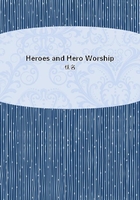
第79章
There is no act more moral between men than that of rule and obedience.
Woe to him that claims obedience when it is not due; woe to him that refuses it when it is! God's law is in that, I say, however the Parchment-laws may run: there is a Divine Right or else a Diabolic Wrong at the heart of every claim that one man makes upon another.
It can do none of us harm to reflect on this: in all the relations of life it will concern us; in Loyalty and Royalty, the highest of these. I esteem the modern error, That all goes by self-interest and the checking and balancing of greedy knaveries, and that in short, there is nothing divine whatever in the association of men, a still more despicable error, natural as it is to an unbelieving century, than that of a "divine right" in people _called_ Kings. I say, Find me the true _Konning_, King, or Able-man, and he _has_ a divine right over me. That we knew in some tolerable measure how to find him, and that all men were ready to acknowledge his divine right when found: this is precisely the healing which a sick world is everywhere, in these ages, seeking after! The true King, as guide of the practical, has ever something of the Pontiff in him,--guide of the spiritual, from which all practice has its rise. This too is a true saying, That the _King_ is head of the _Church_.--But we will leave the Polemic stuff of a dead century to lie quiet on its bookshelves.
Certainly it is a fearful business, that of having your Ableman to _seek_, and not knowing in what manner to proceed about it! That is the world's sad predicament in these times of ours. They are times of revolution, and have long been. The bricklayer with his bricks, no longer heedful of plummet or the law of gravitation, have toppled, tumbled, and it all welters as we see! But the beginning of it was not the French Revolution;that is rather the _end_, we can hope. It were truer to say, the _beginning_ was three centuries farther back: in the Reformation of Luther. That the thing which still called itself Christian Church had become a Falsehood, and brazenly went about pretending to pardon men's sins for metallic coined money, and to do much else which in the everlasting truth of Nature it did _not_ now do: here lay the vital malady. The inward being wrong, all outward went ever more and more wrong. Belief died away; all was Doubt, Disbelief. The builder cast _away_ his plummet; said to himself, "What is gravitation? Brick lies on brick there!" Alas, does it not still sound strange to many of us, the assertion that there _is_ a God's-truth in the business of god-created men; that all is not a kind of grimace, an "expediency," diplomacy, one knows not what!--From that first necessary assertion of Luther's, "You, self-styled _Papa_, you are no Father in God at all; you are--a Chimera, whom I know not how to name in polite language!"--from that onwards to the shout which rose round Camille Desmoulins in the Palais-Royal, "_Aux armes_!" when the people had burst up against _all_ manner of Chimeras,--I find a natural historical sequence. That shout too, so frightful, half-infernal, was a great matter.
Once more the voice of awakened nations;--starting confusedly, as out of nightmare, as out of death-sleep, into some dim feeling that Life was real;that God's-world was not an expediency and diplomacy! Infernal;--yes, since they would not have it otherwise. Infernal, since not celestial or terrestrial! Hollowness, insincerity _has_ to cease; sincerity of some sort has to begin. Cost what it may, reigns of terror, horrors of French Revolution or what else, we have to return to truth. Here is a Truth, as Isaid: a Truth clad in hell-fire, since they would not but have it so!--A common theory among considerable parties of men in England and elsewhere used to be, that the French Nation had, in those days, as it were gone _mad_; that the French Revolution was a general act of insanity, a temporary conversion of France and large sections of the world into a kind of Bedlam. The Event had risen and raged; but was a madness and nonentity,--gone now happily into the region of Dreams and the Picturesque!--To such comfortable philosophers, the Three Days of July, 183O, must have been a surprising phenomenon. Here is the French Nation risen again, in musketry and death-struggle, out shooting and being shot, to make that same mad French Revolution good! The sons and grandsons of those men, it would seem, persist in the enterprise: they do not disown it; they will have it made good; will have themselves shot, if it be not made good. To philosophers who had made up their life-system, on that "madness" quietus, no phenomenon could be more alarming. Poor Niebuhr, they say, the Prussian Professor and Historian, fell broken-hearted in consequence; sickened, if we can believe it, and died of the Three Days!
It was surely not a very heroic death;--little better than Racine's, dying because Louis Fourteenth looked sternly on him once. The world had stood some considerable shocks, in its time; might have been expected to survive the Three Days too, and be found turning on its axis after even them! The Three Days told all mortals that the old French Revolution, mad as it might look, was not a transitory ebullition of Bedlam, but a genuine product of this Earth where we all live; that it was verily a Fact, and that the world in general would do well everywhere to regard it as such.